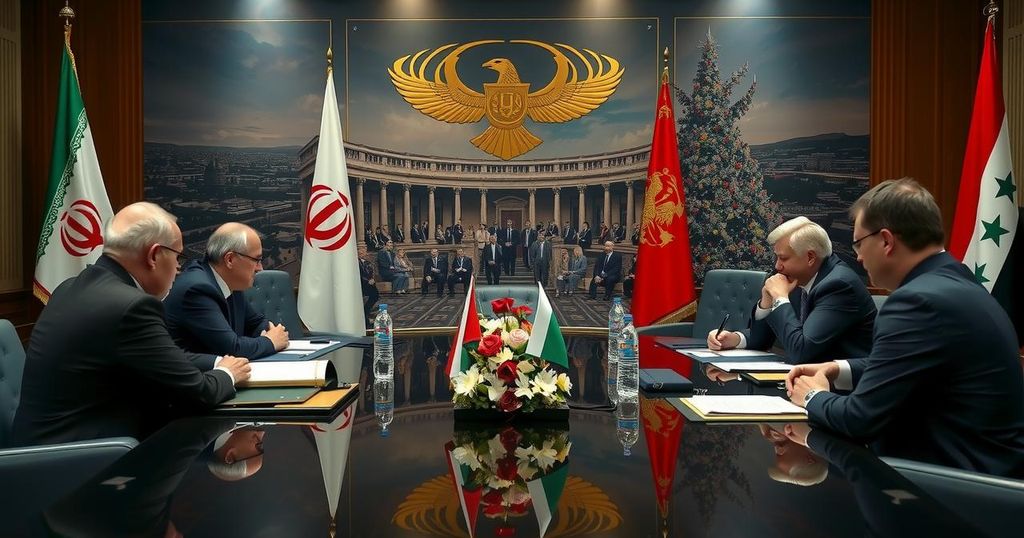Iran and Syria Engage in Astana Talks to Strengthen Regional Relations

A bilateral meeting in Astana between Iranian and Syrian representatives emphasized regional cooperation against Israeli actions, while also indicating Iran’s commitment to strengthening ties with Arab nations, particularly Saudi Arabia. The discussions mark a continuation of a six-year diplomatic effort to stabilize Syria and promote solidarity among Islamic states amid ongoing tensions.
In a recent meeting held in Astana, Kazakhstan, Iranian Foreign Minister’s senior adviser, Ali Asghar Khaji, engaged with a Syrian delegation as part of a longstanding initiative aimed at consolidating peace efforts in Syria involving Iran, Russia, and Turkey. This 22nd round of discussions continues a process that commenced six years ago, focusing on the geopolitical dynamics in the region, particularly as the Syrian government strengthens its position in western Syria. The discussions emphasized the importance of Iran’s role in advocating a united stance against Israeli actions, highlighting the necessity to address the conflicts that plague the region. Despite ambiguity regarding Russia’s and Turkey’s commitments to this process, Iran utilized the platform to renew its focus on regional cooperation and the cessation of hostilities attributed to Israeli aggression. In a bilateral context, the Iranian and Syrian representatives reaffirmed their strategic relations and the enhancement of their bilateral partnership amidst ongoing regional developments. Moreover, these dialogues in Astana coincide with Iran’s efforts to strengthen ties with other Arab nations, as indicated by recent diplomatic engagements with Saudi officials. Iran’s Vice-President, Mohammad Reza Aref, extended an invitation for Saudi Crown Prince Mohammed bin Salman to visit Tehran, underscoring a rekindling of relations between the two nations. Aref articulated the potential widespread benefits that this rapprochement could yield for the entire region and the broader Islamic community. Furthermore, it was reported by Al-Akhbar, a Hezbollah-aligned Lebanese newspaper, that Iraq is proposing an Arab summit to be convened in May to deliberate on regional matters, specifically concentrating on ongoing tensions with Israel and bolstering relationships with Iran. This demonstrates Iran’s endeavor to leverage Iraq as a strategic base, facilitating its influence in the region.
The ongoing discussions taking place in Astana revolve around a collaborative effort led by Iran, Turkey, and Russia, formed in response to the Syrian civil war that began in 2011. The Astana format was initiated to seek resolutions to the ongoing conflict and to establish a framework for diplomatic dialogue amidst complex regional alliances. Iran’s increasing engagement with Arab states, particularly Saudi Arabia, highlights a significant shift towards regional diplomacy, aiming to consolidate ties and address mutual concerns regarding security and stability in the Middle East. The backdrop of these discussions involves intricate geopolitical maneuvers, especially concerning Israel’s actions in the region and the broader implications for regional security dynamics.
The meeting in Astana signifies a critical moment in the ongoing efforts by Iran to solidify its alliances in the Middle East while addressing broader regional issues such as the conflict in Syria and the threats posed by Israel. The reaffirmation of strategic relations between Iran and Syria, alongside efforts to reconcile with Arab states exemplified by the engagements with Saudi Arabia, indicates a potential shift towards enhanced regional cooperation. Furthermore, Iraq’s initiative to host an Arab summit suggests a concerted effort to collectively address pressing issues within the region.
Original Source: www.jpost.com








